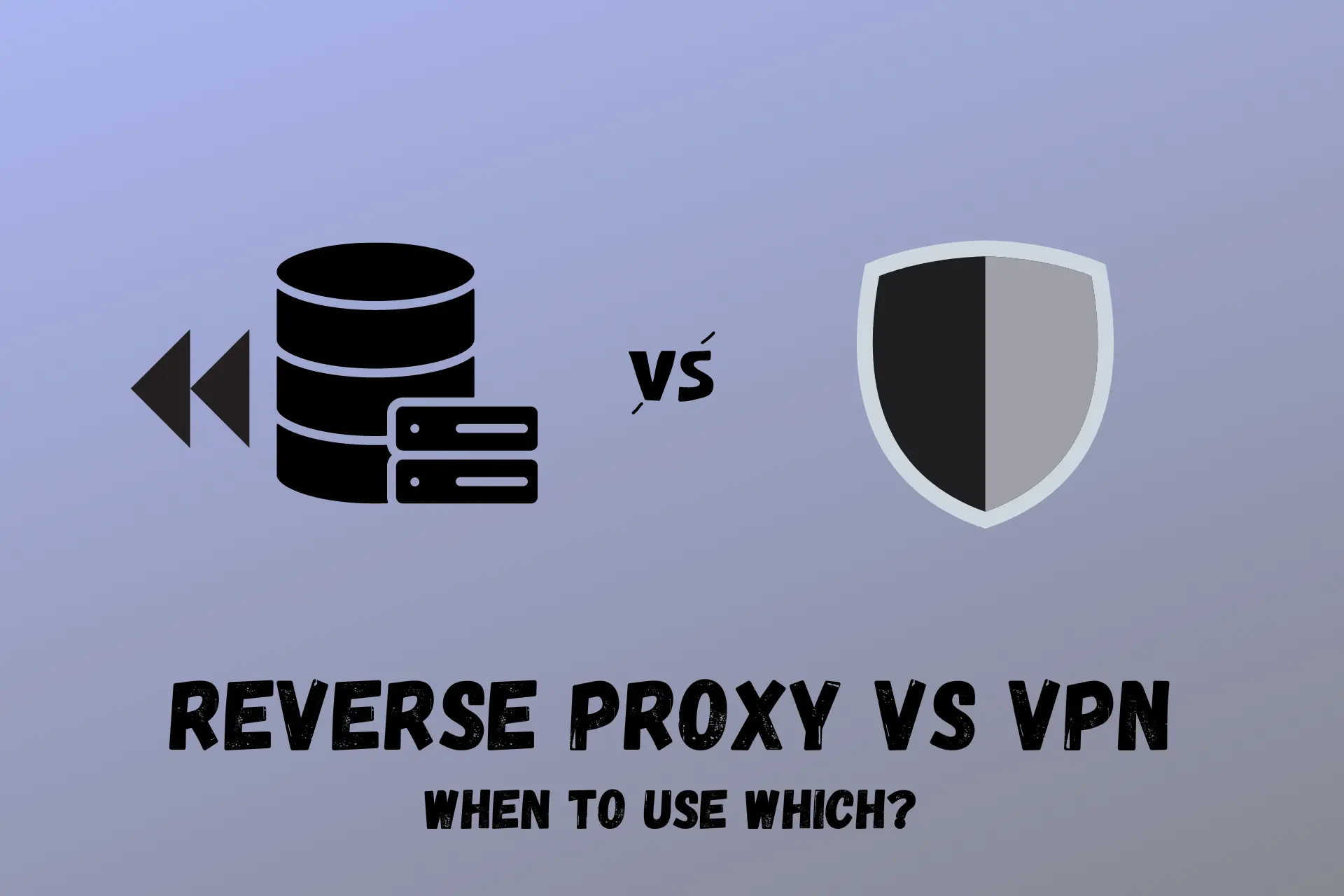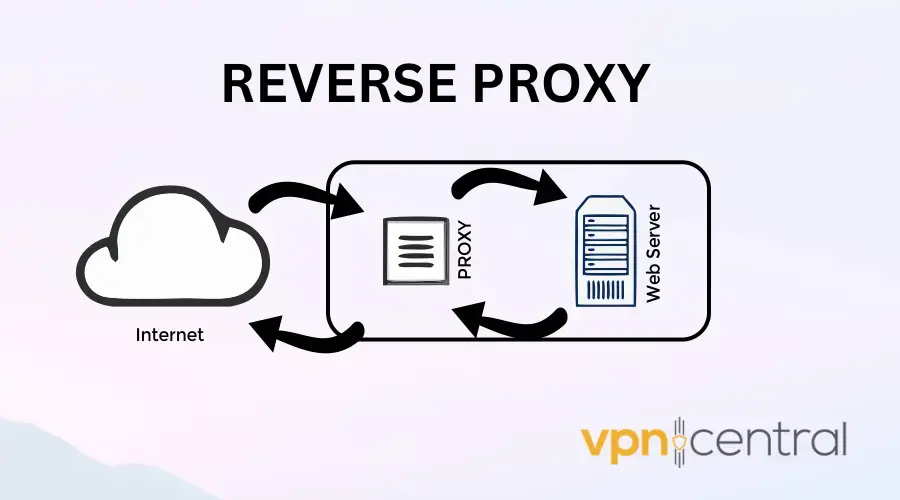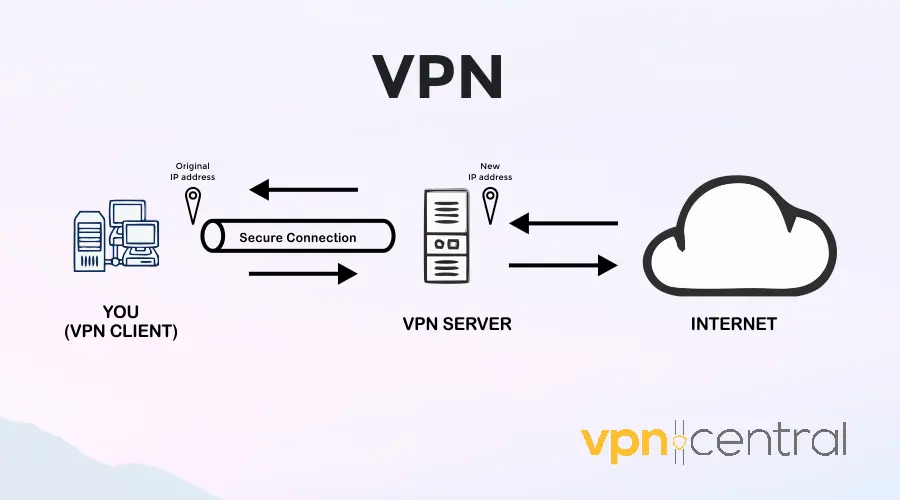Reverse Proxy vs VPN - What They Do & When to Use Them

The security and efficiency of network connections are paramount for remote work, online privacy protection, and preventing potential cyber-attacks.
VPNs and reverse proxies can both help you achieve that, but one protects servers (for websites, apps, and databases), while the other protects data sent over the internet.
Let’s explore the differences between a reverse proxy vs a VPN connection to help you determine which is the best for your online security needs.
Reverse proxy vs VPN – overview
While both can enhance network security and performance, they have different use cases and require different configurations and management practices.
Here’s the summary of the differences in the unique functions of reverse proxy and VPN:
| Features | Reverse Proxy | VPN |
| ⚔️ Security | Prevent DDoS attacks and other web security risks | Provides secure encryption and privacy protection |
| ?️ Anonymity | Hides IP information | Hides IP information & encrypts all traffic |
| ⚡ Speed | Improves response times and server performance | Slower than the reverse proxy |
| ? Cost | Free & Paid | Free & Paid |
| ? Communication | Acts as an intermediary between web servers and the internet | Acts as an intermediary between a client (device) and the internet |
| ? Usability | Relatively easy to setup | Easy to setup apps, difficult manual configuration |
In the following sections, we’ll delve more into the specifics of the functions of reverse proxy and VPN.
What is a reverse proxy?

As you may know, forward proxies act as middlemen between the internet user and the web.
On the other hand, the reverse proxy sits between the web servers and the internet, hence the name. It is used to protect server security, not individual users’ privacy.
This tool distributes incoming traffic among multiple proxy servers.
With that, the reverse proxy hides the server’s real IP, protecting against a direct attack on a website, online database, or application.
It can also help make websites run faster by distributing a large number of requests to multiple servers.
What is a VPN?

In contrast, a VPN allows users to establish a secure and private connection between a client and a private network.
It protects against online privacy risks and gets rid of geographical restrictions.
As opposed to the reverse proxy, the VPN is designated to help the security of the device that sends requests to the internet.
They use remote servers, encryption, and privacy features to make user traffic data untrackable.
Reverse proxy vs VPN
Let’s take a closer look at the differences between the two.
1. Security ⚔️
→ The reverse proxy enhances web security by protecting servers from direct access by filtering incoming malicious traffic.
They’re ideal to prevent DDoS (Distributed Denial of Service) attacks and similar IP-based cyber attacks.
DDoS attacks flood a website with traffic from many different sources. These attacks overload the website, making it unavailable to users.
However, without access to the website’s original IP address, the attack can’t occur.
Another way reverse proxies provide security is through SSL/TLS (Secure Socket Layer/Transport Layer Security) encryption.
SSL/TLS encryption prevents attackers (and ISPs) from viewing or tampering with data exchanged between a user’s web browser and a web/app server.
→ Similarly, a VPN provides end-to-end encryption between the user’s device and the remote server. Commonly used encryptions in VPNs include symmetric AES, RSA, and ChaCha.
They ensure sensitive data, such as personal information or confidential business data, is kept private and secure.
This makes the VPN an effective solution for protecting all the information sent from a device to the internet.
Additionally, reliable VPN services employ a few extra security features when developing their apps. For instance, they include a killswitch that stops all traffic if the connection works.
2. Anonymity ?️
While a VPN conceals the identities of clients, a reverse proxy conceals the identities of web servers.
→ To put it simply, the reverse proxy hides the IP address of a website, while the VPN hides the IP address of a device that has internet access and sends any request over the internet.
So the difference here comes down to each service’s use cases.
If you’re a website or app admin and want to protect its security, then go for the reverse proxy.
On the other hand, if you’re looking for a way to protect the sensitive data you send over the internet, such as credit card info, personal address, or legal documents, use a VPN.
3. Speed ⚡
→ A reverse proxy helps to speed up website response. It does this by caching content and reducing server load.
By caching content, a reverse proxy is storing frequently accessed files and data in memory or on a hard drive.
They can be quickly retrieved and served to users without the need to access the origin server. As a result, it can reduce the load on the origin servers and improve client response times.
At the same time, the reverse proxy forwards the traffic requests to multiple servers that can fulfill all of them, without the risk of your site going offline when there’s a lot of traffic on it.
→ On the other hand, VPN may slow down internet speeds due to the overhead of encrypting and decrypting data.
But there are two sides to every coin, and there are situations where VPNs can actually improve speed.
For one, VPNs can allow you to connect to a high-quality server that has better rates than your internet service providers.
They can also help reduce ping on games and platforms that are geographically located far away from your real ISP internet server.
4. Usability ?
A reverse proxy is easy to set up and use, especially for web traffic optimization and distribution, for better user experiences and overall system efficiency.
While VPNs can provide benefits such as privacy and improved speed, setting them up manually can be difficult.
Fortunately, many VPN providers offer apps that make it easier to configure and use a VPN.
5. Remote access ?
Some reverse proxy technologies can be configured to provide website admins remote access to internal servers such as web servers, applications, or services.
By acting as a gateway, the reverse proxy can provide a secure and controlled way without requiring to connect directly to the internal network.
It’s important to note that not all reverse proxies provide remote access functionality.
At the same time, VPNs for remote access are commonly used to securely connect a user’s device to a corporate network.
This helps to create an encrypted connection between the user’s device and a remote server, so none of the private information can be stolen or tracked.
6. Cost considerations ?
→ Reverse proxies are relatively inexpensive. In fact, you have the option to set up and manage them for free, especially if you use open-source solutions like Nginx or Apache.
→ On the other hand, the best VPNs on the market are premium-tier. If you want to stay connected permanently, without data caps, you’ll have to invest in one of those.
Luckily, a lot of reliable VPNs do offer cheap subscription prices, starting with a bit over 2$ /month.
However, if you’re only interested in using it occasionally, you can make use of a free VPN that doesn’t require registration.
Let’s consider when to use each tool.
When to use a reverse proxy or a VPN
We will explore some common scenarios and use cases for reverse proxy and VPN to help you make an informed decision on which tool to use in different situations.
Reverse proxies help web security & performance
Thanks to the way reverse proxies are configured, they’re ideal tools to help with:
- Workload balancing: When a lot of people access a website’s servers at the same time, a reverse proxy will help balance the traffic across multiple servers to maintain website performance.
- Web caching: It caches frequently accessed web content to improve response speed and reduce the workload on the origin server.
- Website security: Prevents DDoS attacks and maintains your website’s IP private. It also helps to filter out malicious traffic and prevent unauthorized access to web resources.
VPNs secure traffic data you send over the web
Using a VPN shields the data you send over the internet and preservers anonymity, making the tool ideal for:
- Remote work: With business VPNs and VPN bridges, remote workers and employees from different office locations can access the company’s network securely.
- Public WiFi protection: A VPN will help protect your data when using public WiFi, such as in a coffee shop or airport, making you less vulnerable to hacking and tracking.
- Stop online censorship and monitoring: In countries where internet usage may be monitored or restricted, VPN usage is highly recommended to ensure your online activities are private and secure.
- Geo-unblocking: VPNs also help you bypass geographical restrictions by changing your IP address to one from a different country.
- Private data protection: VPN encryption ensures no one can sniff upon sensitive data such s card information, health documents, or other personal details you won’t want public.
Wrap up
Both reverse proxies and VPNs have their unique trade-offs in performance, security, and usability.
Reverse proxy helps in optimizing web traffic, while VPN is used for secure access to a private network or the internet.
VPNs are often used by internet users seeking privacy and security, while the reverse proxy is typically used for public-facing web applications and content-heavy websites.
Consequently, deciding whether to use a reverse proxy vs a VPN depends on what exactly you want to achieve.
Read our disclosure page to find out how can you help VPNCentral sustain the editorial team Read more






User forum
0 messages